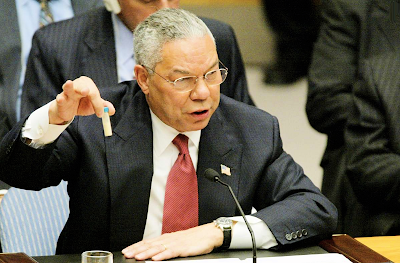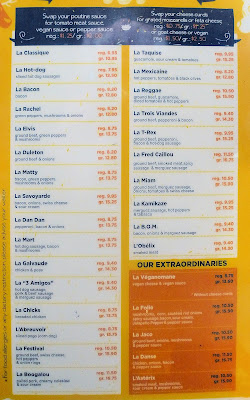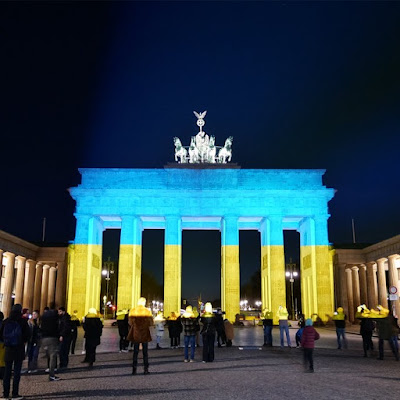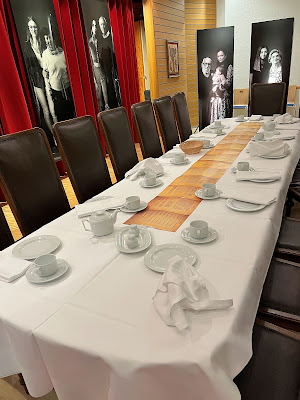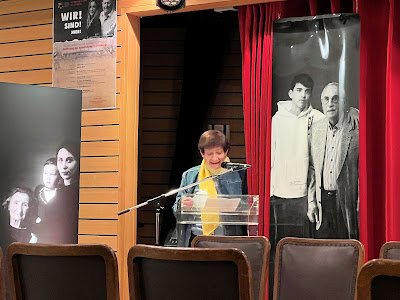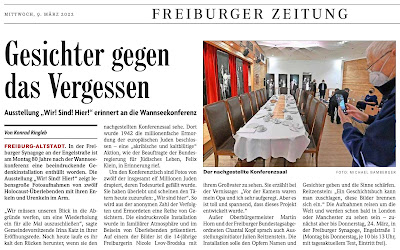The German bomb has haunted me since I listened to a lecture series at
Göttingen University in the winter of 56/57 on
Atomtechnik, ihre Voraussetzungen und Folgen.
Carl Friedrich von Weizsäcker, a former assistant to Heisenberg and ex-physics professor at the
Reichsuniversität Straßburg, talked about Atomic engineering, its
prerequisites, and its consequences.
For a modest semester fee of 12 marks, the master himself lectured on Quantenmechanik mit Übungen (Quantum mechanics with exercises) at Munich University during the summer of 59. You had to come early at the start of the series to get a seat. Later, listeners of other faculties had satisfied their curiosity, especially since it was all mathematics and Heisenberg was not a gifted speaker.
There are two extreme positions on the German atomic bomb:
According to Rose, "Heisenberg was a Nazi; otherwise, he would have joined other German physicists who went abroad following Hitler's takeover in 1933," as there were Hans Bethe, Max Born, Albert Einstein, Paul Peter Ewald, James Franck, Maria Goeppert-Mayer, Walter Heitler, Heinrich Gerhard Kuhn, Karl Meissner, Lise Meitner, Rudolf Peierls, Fritz Reiche, Otto Stern, and many others.
They were Hitler's Gift, as Jean Medawar & David Pyke called those
scientists who fled Nazi Germany in their book. Hitler commented, "If the dismissal of Jewish scientists means the annihilation of
German science, then we shall do without science for a few years."
What a brain drain! The exodus of German scientists was so great that by 1935 one-third of the members of the German Physical Society lived abroad.
Rose's subtitle, A Study in German Culture, spouts an irreconcilable hatred of Heisenberg and his German colleagues. He and other historians accuse Heisenberg of hypocrisy, untruthfulness, and incompetence in his field, for he had miscalculated the critical mass. In particular:
"Since Heisenberg did not know how to build a bomb, he could not have withheld that knowledge and Heisenberg did not want Germany to lose the war. There is no evidence whatsoever that he pretended to support the war effort while secretly trying to undermine it."
The other, the German Lesart (interpretation), is presented by Heisenberg and seconded by von Weizsäcker, who writes, "While I do indeed think that we thought about the moral problem of atomic bombs very early on and that we did nothing during the war that we would have to reproach ourselves for today, I think that we as a nation and generally also as individuals have mastered the moral problem of National Socialism too little to get on our high horse now."
"The realization of our technical inability to produce atomic bombs in wartime has indeed spared us the real moral decision. How we would have behaved if we had really been able to make the bomb, I dare not say. I suspect we would have been at odds with ourselves as American physicists have become. That is why Heisenberg and I always chose the form of saying publicly that we could not make the bomb and that we were glad of it."
Already in 1956, Robert Jungk had forwarded the above narrative in his book Brighter than a Thousand Suns, "The German physicists had failed to build an atomic bomb for Hitler not because they couldn't, but because they wouldn't." Later Heisenberg scolded Jungk for glorifying him as a "resister."
In 1993, Thomas Powers gave an extra twist to the German Lesart in his book Heisenberg's War: The Secret History of the German Bomb. Powers argues that Heisenberg basically knew all along exactly how to build the bomb, deliberately withheld and obscured that knowledge from the Nazis, and went to Copenhagen to let Bohr in on what the Nazis were up to.
In his 1998 drama, Copenhagen dealing with a visit Werner Heisenberg paid to his mentor Niels Bohr in 1941, Michael Frayn tried to shed light on the question, "Did German scientists under Heisenberg's leadership work on an atomic bomb?" repeating all the known arguments. Red Baron saw the successful play on stage both in English and German.
What a brain drain! The exodus of German scientists was so great that by 1935 one-third of the members of the German Physical Society lived abroad.
Rose's subtitle, A Study in German Culture, spouts an irreconcilable hatred of Heisenberg and his German colleagues. He and other historians accuse Heisenberg of hypocrisy, untruthfulness, and incompetence in his field, for he had miscalculated the critical mass. In particular:
"Since Heisenberg did not know how to build a bomb, he could not have withheld that knowledge and Heisenberg did not want Germany to lose the war. There is no evidence whatsoever that he pretended to support the war effort while secretly trying to undermine it."
The other, the German Lesart (interpretation), is presented by Heisenberg and seconded by von Weizsäcker, who writes, "While I do indeed think that we thought about the moral problem of atomic bombs very early on and that we did nothing during the war that we would have to reproach ourselves for today, I think that we as a nation and generally also as individuals have mastered the moral problem of National Socialism too little to get on our high horse now."
"The realization of our technical inability to produce atomic bombs in wartime has indeed spared us the real moral decision. How we would have behaved if we had really been able to make the bomb, I dare not say. I suspect we would have been at odds with ourselves as American physicists have become. That is why Heisenberg and I always chose the form of saying publicly that we could not make the bomb and that we were glad of it."
Already in 1956, Robert Jungk had forwarded the above narrative in his book Brighter than a Thousand Suns, "The German physicists had failed to build an atomic bomb for Hitler not because they couldn't, but because they wouldn't." Later Heisenberg scolded Jungk for glorifying him as a "resister."
In 1993, Thomas Powers gave an extra twist to the German Lesart in his book Heisenberg's War: The Secret History of the German Bomb. Powers argues that Heisenberg basically knew all along exactly how to build the bomb, deliberately withheld and obscured that knowledge from the Nazis, and went to Copenhagen to let Bohr in on what the Nazis were up to.
In his 1998 drama, Copenhagen dealing with a visit Werner Heisenberg paid to his mentor Niels Bohr in 1941, Michael Frayn tried to shed light on the question, "Did German scientists under Heisenberg's leadership work on an atomic bomb?" repeating all the known arguments. Red Baron saw the successful play on stage both in English and German.

|
|
Elisabeth Heisenberg, Niels Bohr, and Werner Heisenberg at a conference in Copenhagen in 1937 (©William Sweet) |
There is more to the photo. Red Baron recognizes
Victor Weisskopf
- then dark-haired - standing left in the background. As an Austrian Jew, Weisskopf left the
Mecca of quantum physics, Göttingen, in 1933 for Zürich to work with
Wolfgang Pauli. From 1936 on, he stayed with Niels Bohr in Copenhagen until he emigrated to
the States in 1937. There he worked on the Manhattan Project, the American
atomic bomb program. From 1961 to 1966, Weisskopf served as director-general of
CERN, the European Center for High-Energy Physics, which Red Baron joined in 1968.
Here is Heisenberg's recollection of the Copenhagen meeting in a letter to
Jungk,
"Being aware that Bohr was under the surveillance of the German political
authorities and that his assertions about me would probably be reported to
Germany, I tried to conduct this talk in such a way as to preclude putting
my life in immediate danger. This talk probably started with my question
as to whether or not it was right for physicists to devote themselves in
wartime to the uranium problem - as there was the possibility that progress
in this sphere could lead to grave consequences in the technique of war.
Bohr immediately understood the meaning of this question, as I realized from
his slightly frightened reaction. He replied, as far as I can remember, with a
counter-question: 'Do you really think that uranium fission could be
utilized for the construction of weapons?' I may have replied: 'I know this is in principle possible, but it would require a terrific technical
effort, which, one can only hope, cannot be realized in this war.' Bohr was
shocked by my reply, obviously assuming that I had intended to convey to him
that Germany had made great progress in the direction of manufacturing
atomic weapons."
The corresponding passage in Heisenberg's autobiography Der Teil und das Ganze is practically identical to the above text.
Von Weizsäcker's later statement is not supported by Heisenberg's narrative, "The true goal of the visit by Heisenberg with Bohr was . . . to discuss with Bohr whether physicists all over the world might not be able to join together so that the bomb not be built."
Therefore Rose's comment is relevant to von Weizsäcker but not to Heisenberg, "If Heisenberg went to Copenhagen with the notion of proposing a mutual non-aggression pact between physicists, there is no evidence that he or any other wartime visitors to Bohr ever made such a proposal (sic!)."
Rose's conclusions, "Although memories fade and Heisenberg and von Weizsäcker surely talked themselves into believing that what they said after the war about Copenhagen was really true, just about everything either one of them ever said on the subject - right down to von Weizsäcker's latest comments upon release of the draft Bohr letters - has been flatly untrue."
The corresponding passage in Heisenberg's autobiography Der Teil und das Ganze is practically identical to the above text.
Von Weizsäcker's later statement is not supported by Heisenberg's narrative, "The true goal of the visit by Heisenberg with Bohr was . . . to discuss with Bohr whether physicists all over the world might not be able to join together so that the bomb not be built."
Therefore Rose's comment is relevant to von Weizsäcker but not to Heisenberg, "If Heisenberg went to Copenhagen with the notion of proposing a mutual non-aggression pact between physicists, there is no evidence that he or any other wartime visitors to Bohr ever made such a proposal (sic!)."
Rose's conclusions, "Although memories fade and Heisenberg and von Weizsäcker surely talked themselves into believing that what they said after the war about Copenhagen was really true, just about everything either one of them ever said on the subject - right down to von Weizsäcker's latest comments upon release of the draft Bohr letters - has been flatly untrue."
I must admit that only recently, I became aware of the existence of those drafts Bohr wrote in 1960. They are discussed in a paper published in 2002 by William Sweet, No More Uncertainty. This is why I took up the subject of the German atomic bomb again in scrutinizing the original citations of the protagonists conveniently embedded as such in Sweet's paper.
Bohr drafted his letters to send them to Heisenberg, which he never did. Bohr's family released the drafts in 2002. At the time of their publication, they were regarded as a sensation solving the enigma of the Copenhagen meeting. Here are Bohr's salient lines:
"However, what I am thinking of in particular is the conversation we had in my office at the Institute, during which, because of the subject you raised, I carefully fixed in my mind every word that was uttered. It had to make a very strong impression on me that at the very outset, you stated that you felt certain that the war if it lasted sufficiently long, would be decided with atomic weapons. I had, at that time, no knowledge at all of the preparations that were underway in England and America. When I perhaps looked doubtful, you added that I had to understand that you had occupied yourself almost exclusively with this question in recent years and did not doubt that it could be done. It is, therefore, quite incomprehensible to me that you should think that you hinted to me that the German physicists would do all they could to prevent such an application of atomic science. During the conversation, which was only very brief, I was naturally very cautious. Nevertheless, I thought a lot about its content, and my alarm was not lessened by hearing from the others at the Institute that Weizsäcker had stated how fortunate it would be for the position of science in Germany after the victory that you could help so significantly towards this end."
"In your letter to Jungk, you also mention Jensen's* visits to Copenhagen in 1943 during his journeys to Norway to participate in the efforts to increase the production of heavy water. It is true that Jensen emphasized that this work was only aimed at producing energy for industrial purposes. Still, although we were inclined to trust his sincerity, we felt in no way certain regarding how much he knew about the whole effort in Germany."
*Johannes Hans Daniel Jensen was visiting professor at the University of Wisconsin–Madison in 1951
Are the differences between Heisenberg's and Bohr's presentation of the actual
meeting so great to forward a dramatically new "Copenhagen interpretation*? "
*My physics colleagues may forgive me
The bold statements about a possible German victory young Carl Friedrich apparently had made to other people at the Institute are new to me.
Bohr's remarks about the Jensen visit should have reinforced the "old man's" belief that German physicists worked on a deuterium-moderated reactor. Still, after Heisenberg's unfortunate visit, Bohr believed no one anymore.
At the time of the Copenhagen visit, there was indeed the twist of a plutonium bomb because von Weizsäcker and Fritz Houtermans had shown that a reactor could be used to produce plutonium, which in turn could be used to make an atomic bomb, bypassing the much more challenging problem of separating uranium 235 from 238 to obtain the requisite fissionable material.
*My physics colleagues may forgive me
The bold statements about a possible German victory young Carl Friedrich apparently had made to other people at the Institute are new to me.
Bohr's remarks about the Jensen visit should have reinforced the "old man's" belief that German physicists worked on a deuterium-moderated reactor. Still, after Heisenberg's unfortunate visit, Bohr believed no one anymore.
At the time of the Copenhagen visit, there was indeed the twist of a plutonium bomb because von Weizsäcker and Fritz Houtermans had shown that a reactor could be used to produce plutonium, which in turn could be used to make an atomic bomb, bypassing the much more challenging problem of separating uranium 235 from 238 to obtain the requisite fissionable material.
Sweet ends his paper on No More Uncertainty, "Had the decision gone the other way in 1941/42 - had the Nazis launched an all-out bomb development program - there is absolutely no reason to think Heisenberg would not have dutifully contributed. Then, had the war gone on long enough and the Manhattan Project failed, a German atomic bomb might indeed have been the deciding factor in the war, just as Heisenberg told Bohr it would be at Copenhagen."
There are too many would and might. Sweet's statement and the Bohr letters
did not change my conclusion made in 2004 in a lecture on The Myth of the German Atomic Bomb. My German-speaking followers may like to read the
text of that talk on my website.
Here is the English translation of my conclusion, "The position of the German researchers on the construction of the atomic bomb ultimately remains ambivalent: Could they and did they not want to make the bomb, as Robert Jungk claims, or did they not and could they not, a position roughly held by Thomas Powers, or did they want and couldn't, as Paul Lawrence Rose imputes to them in his book."
For me, uncertainty still prevails.
Here is the English translation of my conclusion, "The position of the German researchers on the construction of the atomic bomb ultimately remains ambivalent: Could they and did they not want to make the bomb, as Robert Jungk claims, or did they not and could they not, a position roughly held by Thomas Powers, or did they want and couldn't, as Paul Lawrence Rose imputes to them in his book."
For me, uncertainty still prevails.
*










